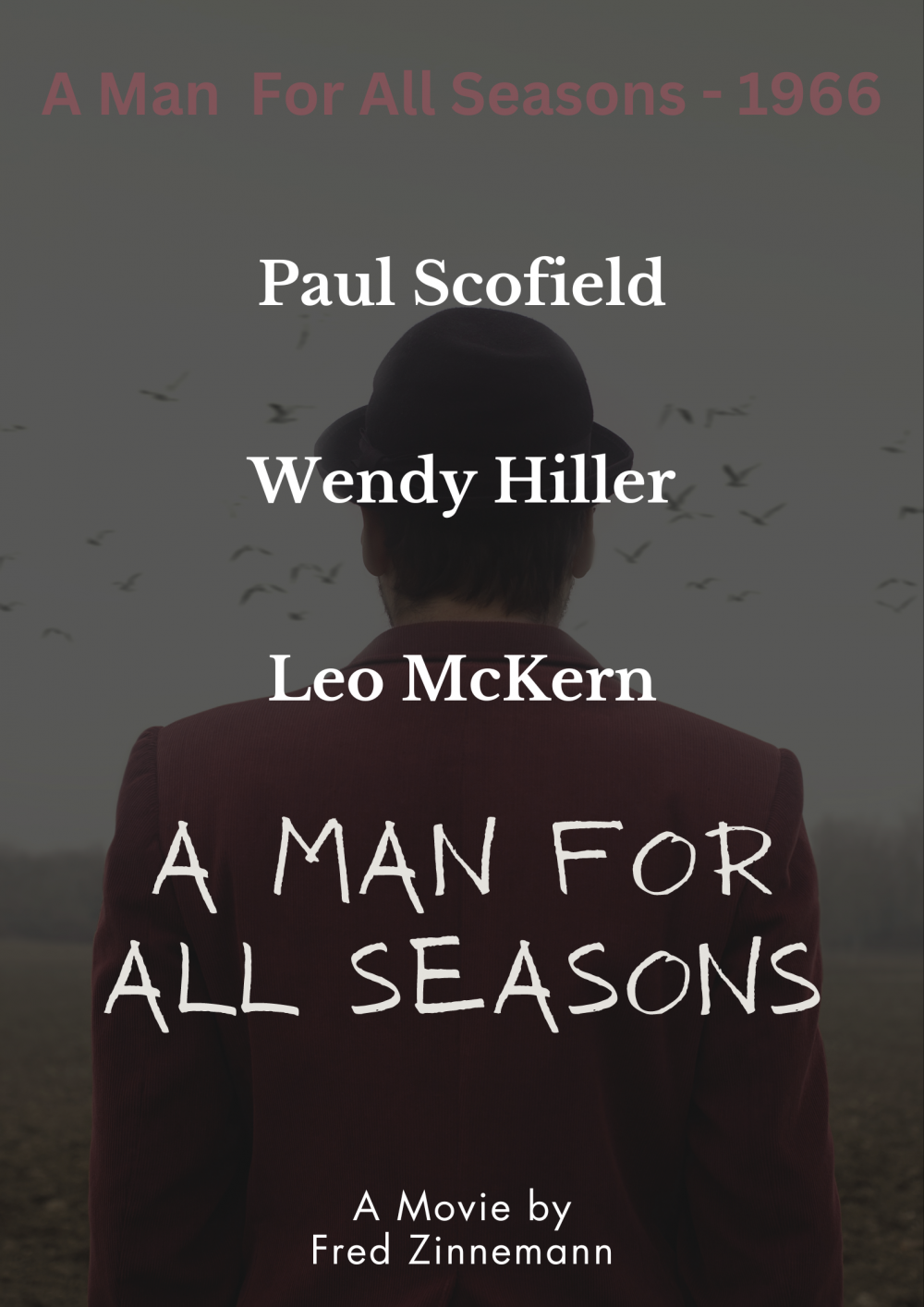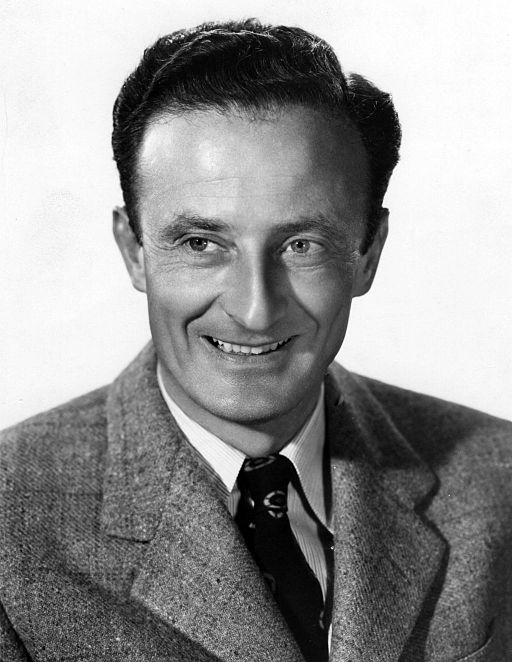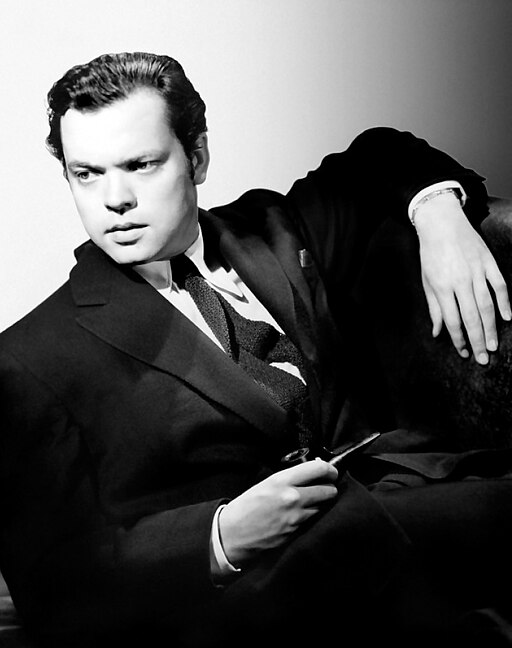A Man for All Seasons - 1966
back| Released by | Columbia Pictures |
| Producer | Fred Zinnemann |
| Script | Robert Bolt (based on his own play) |
| Cinematography | Ted Moore |
| Music by | Georges Delerue |
| Running time | 120 minutes |
| Film budget | Approximately $2 million |
| Box office sales | Approximately $28 million (worldwide) |
| Main cast | Paul Scofield - Wendy Hiller - Leo McKern - Robert Shaw - Orson Welles |
| Director | Fred Zinnemann |
A Man for All Seasons - Fred Zinnemann's historical classic
"A Man for All Seasons," was released in 1966 based upon the screenplay of Robert Bolt about the life of Thomas More, the English 16th Century philosopher and statesman who later became Saint Thomas. Direction and production were in the capable hands of Fred Zinnemann and that shows. He chose the authentic English landscape as the background of this historical drama that delves into the tumultuous relationship between church and state. The plot revolves around exploring the moral and existential dilemmas faced by Sir Thomas More amid the religious reformation ushered in by King Henry VIII.
The leading role is magnificently played by Paul Scofield. The same goes for his adversary, Thomas Cromwell, played by Leo McKern.
Related
Plot Summary
The film unfurls the tragic story of Sir Thomas More, a highly principled lawyer and devout Catholic, navigating through a politically-charged England where King Henry VIII seeks to usurp the power of the Catholic Church to serve his personal and political ambitions. When More refuses to endorse the king’s separation from the Catholic Church to marry Anne Boleyn, a cascade of moral and legal conflicts ensues, resulting in a tragic climax that pits individual morality against governmental coercion.
Complete cast of A Man for All Seasons
- Paul Scofield as Sir Thomas More: A principled statesman who stands against King Henry VIII’s separation from the Catholic Church.
- Wendy Hiller as Alice More: Thomas More's supportive and pragmatic wife.
- Robert Shaw as King Henry VIII: The boisterous and determined monarch seeking to establish his own church.
- Leo McKern as Thomas Cromwell: A shrewd and ambitious statesman, serving King Henry VIII.
- Orson Welles as Cardinal Wolsey: A high-ranking church official who navigates through the religious and political intrigues.
- Susannah York as Margaret More: The loving and intelligent daughter of Thomas More.
- Nigel Davenport as The Duke of Norfolk: A friend to More but also a loyal servant to the King.
- John Hurt as Richard Rich: An ambitious young man who ultimately betrays More.
- Corin Redgrave as William Roper: More's idealistic son-in-law.
- Colin Blakely as Matthew: More’s loyal servant.
- Vanessa Redgrave as Anne Boleyn
- Cyril Luckham as Archbishop Cranmer: A church official who supports King Henry VIII’s stance.
- Jack Gwillim as Chief Justice: The judge presiding over More’s trial.
- Thomas Heathcote as Boatman: A minor role that contributes to depicting daily life around the River Thames.
- Yootha Joyce as Averil Machin: A woman who is engaged in a relationship with Rich.
- Anthony Nicholls as King's Representative: Serving as a voice for the King in certain situations.
Themes and Relevance for "A Man for All Seasons"
- Moral Integrity: The film explores the profundities of moral courage, spotlighting More’s unwavering integrity in the face of governmental pressure and personal endangerment.
- Church vs. State: An exploration of the dichotomies and conflicts between religious tenets and political ambitions runs prominently through the narrative.
- Personal vs. Public: More’s struggle symbolizes the eternal conflict between personal convictions and public obligations, providing a resonant theme that remains relevant in various societal contexts.
Significant Aspects
- Casting: Paul Scofield, reprising his stage role, delivers a monumental performance, infusing More with a quiet yet unyielding strength that stands in stark contrast to the turbulent political panorama unfolding around him.
- Historical Context: While based on historical events, the film also serves as a commentary on the contemporaneous social and political climate, addressing themes of governmental overreach, individual freedoms, and moral imperatives.
- Adaptation: Adapted from Robert Bolt’s own successful stage play, the film masterfully navigates the transition from stage to screen, maintaining the dialogue-driven profundity while utilizing cinematic techniques to expand upon the thematic and visual scope.
Criticism and Acclaim
- Acclaim: The film was heralded for its insightful screenplay, powerful performances, and its skillful blending of historical drama with pertinent existential and moral inquiries.
- Criticism: While largely celebrated, some critiques revolved around its perceived verbose nature and the potential for historical anachronisms or liberties taken for narrative convenience.
Awards and nomination for “A Man for All Seasons”
“A Man for All Seasons,” garnered widespread critical acclaim and achieved significant success during the awards season.
Academy Awards (Oscars) 1967:
Wins:
- Best Picture: The film won the top honor, solidifying its reputation as one of the year's best productions.
- Best Director - Fred Zinnemann: Zinnemann received acclaim for his masterful direction, earning him the Best Director award.
- Best Actor - Paul Scofield: Scofield’s portrayal of Sir Thomas More was highly praised, earning him the Best Actor award.
- Best Adapted Screenplay - Robert Bolt: Bolt’s adaptation of his own play was recognized with an Oscar.
- Best Cinematography - Ted Moore: The film's stunning visuals, achieved through Moore's cinematography, were honored with an Oscar.
- Best Costume Design - Elizabeth Haffenden: The film’s period-accurate and visually impressive costumes were recognized with this award.
Nominations:
- Best Supporting Actor - Robert Shaw: Shaw’s portrayal of King Henry VIII earned him a nomination in this category.
- Best Supporting Actress - Wendy Hiller: Hiller’s performance was recognized with a nomination.
- Best Sound: The film’s sound design was also nominated.
BAFTA Awards:
Wins:
- Best British Film
- Best British Art Direction (Colour) - John Box and Terence Marsh
Nominations:
- Best Film from any Source
- Best British Actor - Paul Scofield
- Best British Screenplay - Robert Bolt
Golden Globe Awards:
Wins:
- Best Motion Picture – Drama: The film took home the top honor in the drama category.
- Best Director - Fred Zinnemann
- Best Actor in a Motion Picture – Drama - Paul Scofield
Nominations:
- Best Supporting Actor – Motion Picture - Robert Shaw
- Best Screenplay - Robert Bolt
Other Awards and Honors:
The film also received various other awards and nominations from film festivals and critics associations around the world, further cementing its status as a critically acclaimed film.
Important quotes from the film
Sir Thomas More:
- "I think that when statesmen forsake their own private conscience for the sake of their public duties, they lead their country by a short route to chaos."
- "I do none harm, I say none harm, I think none harm. And if this be not enough to keep a man alive, in good faith I long not to live."
Richard Rich:
- "But every man has his price!" Sir Thomas More's response to Rich's statement is often recalled:
- "It would depend on the good. But, yes, I’d give the Devil benefit of law, for my own safety’s sake!"
The Duke of Norfolk:
- "Oh confound all this. I'm not a scholar, I don't know whether the marriage was lawful or not but dammit, Thomas, look at these names! Why can't you do as I did and come with us, for fellowship!"
To which More responds with another impactful line:
- "And when we die, and you are sent to heaven for doing your conscience, and I am sent to hell for not doing mine, will you come with me, for fellowship?"
King Henry VIII:
- "Thomas. I chose the right man for Chancellor!"
- "The nobility of England, my lord, would have snored through the Sermon on the Mount, but you'll labor like Thomas for a... Sir Thomas!...for a hawk, a horse, or a woman!"
Alice More:
- "Arrest him!" Sir Thomas More responds:
- "For what?" Alice More continues:
- "He's bad!"
And More delivers a foundational principle of law:
- "There is no law against that."
Margaret More:
- "Father, that man's bad." More’s reply subtly reveals the dichotomy of lawful actions and moral values:
- "There's no law against that."
Sir Thomas More:
- "I am the King's true subject, and I pray for him and all the realm. I do none harm. I say none harm. I think none harm. And if this be not enough to keep a man alive, then in good faith, I long not to live."
Cultural Impact
"A Man for All Seasons" has been celebrated both for its intrinsic cinematic qualities and its profound thematic explorations. It persists as a poignant exploration of the struggles between personal conscience and obedience to authority, providing a timeless reflection on the nature of integrity, resistance, and sacrifice.
In both its critical and commercial success, the film underlines the universal and timeless appeal of stories that explore the complexities of morality, governance, and individual agency within larger societal and systemic structures. Through its potent narrative, compelling performances, and thematic depth, "A Man for All Seasons" endures as a cinematic masterpiece that continues to engage, challenge, and resonate with audiences across varied temporal and cultural contexts.



